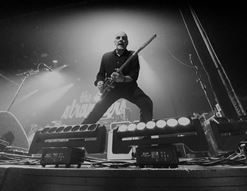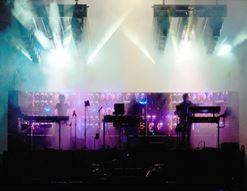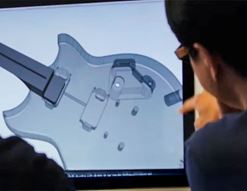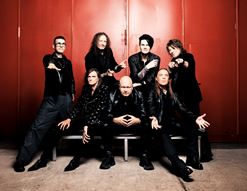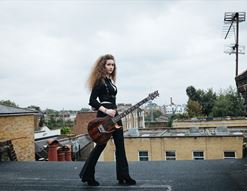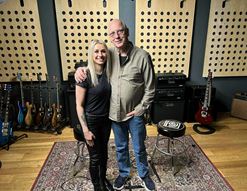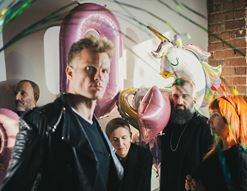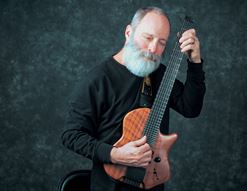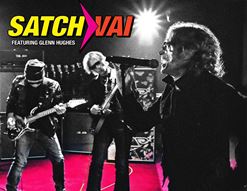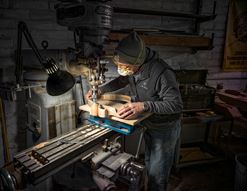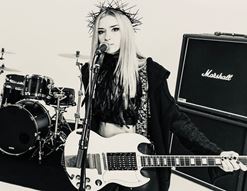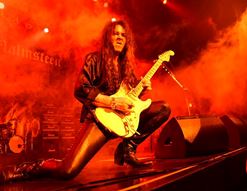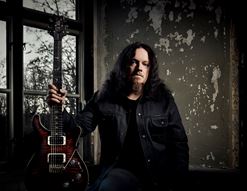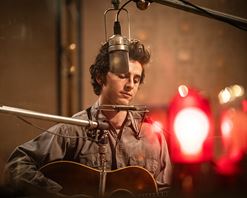Occasionally, an artist comes along who is wonderfully out of step with everything that is currently happening. Things like scenes and genres are a little less meaningful compared with a unique creator following their own path. Their uniqueness is their power.
This is how it is with Swedish singer-songwriter Jonathan Hultén, an artist I first discovered around five years ago when his debut album Chants From Another Place was released. I was immediately hooked by his spellbinding, otherworldly songcraft, which mixed folk with magic in a way that was fresh and involving.
Hultén’s artistry emanates from everything: his artwork adorns his album covers and promo videos, and his live performances are dramatic affairs complete with costumes, makeup and set dressing. He’s the full package, with a personal aesthetic that fits entirely with his otherworldly, folk-inflected music.
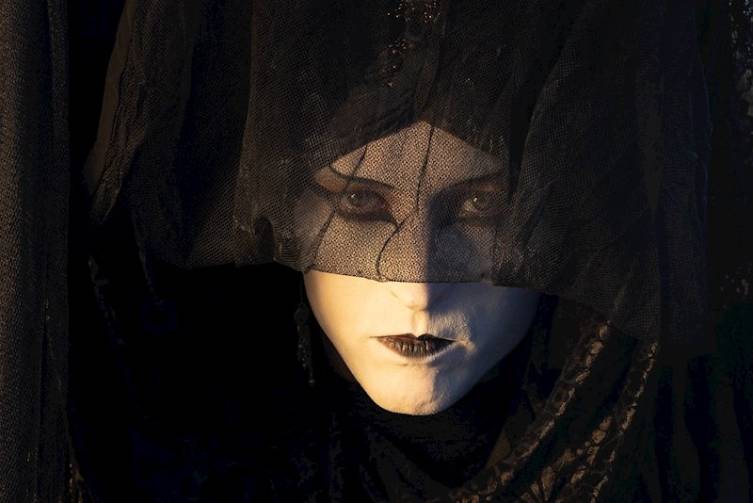
We chatted via email (click through to the first Jonathan Hultén Interview) at the time, where Jonathan spoke about his songwriting methods, theatrical presentation and more.
But that was five years ago, and now Hultén has a wonderful new album due for release on January 31st. Entitled Eyes of the Living Night, this second album of new songs (he has also released Forest Sessions, comprised of alternate versions of songs from Chants) expands and develops on the promise of the first record with a richer, more involved sound.
I had to know more!
As synchronicity would have it, Hulten was performing in Edinburgh, supporting The Cult on their 40th Anniversary tour. Always an opportunist, I decided to try and make a day of it, and reached out to both parties. My hopes were realised, and so in the late afternoon I met up with Billy Duffy (click to read my Billy Duffy 2024 interview), and before that, I caught up with Jonathan for our first in-person conversation.
We spent a wonderful hour chatting in his dressing room, discussing mythology, video games, journeys, destinations and a lot more. As I’d hoped, Jonathan was a fantastic person to talk to: articulate and eloquent, he was a friendly, cheerful, very good communicator. Because of this, I’ve decided to only lightly edit the conversation below. He’s a fascinating guy and I hope you enjoy this exclusive interview!
Contents
Narratives, Keys & a Bad Van Halen Analogy
Universe Building, and Creating Those Outfits
Afterlife & the Labyrinth
Guitarguitar: So, the new record is gorgeous! I figured I should start our conversation with the first single, Afterlife, because that’s going to be, for many people, the doorway into the album. I am getting some references to mythology, Greek mythology in particular, I suppose, with references to the labyrinth. I wondered if you were deliberately drawing from classical mythology and that sort of perpetual storytelling with this particular song?
Jonathan Hultén: Well, the symbol of the labyrinth and the underworld are very powerful symbols for struggle, and for when you’re feeling lost and can’t find your way out. It’s very applicable to many situations in our lives and throughout our lives in different forms.
Of course the thread of Ariadne and the Minotaur; that story for sure has influenced me a lot, but I wouldn’t say it has influenced me in particular for this song. In general, the idea of going - both physically perhaps, but more so importantly going within ourselves - going through an emotional labyrinth of trying to figure yourself out, or a situation that you’re in, and finding a way forward. A sense of feeling lost and in order to find a way forward, you have to navigate and find out what you’re missing, and then find those pieces of the puzzle in order to follow the path ahead, for it to reveal itself.
GG: I see, yes. That actually neatly moves me onto another question I wanted to ask you: I wondered - and we could use any song but we may as well use Afterlife as an example - when you go to write a piece like that, are you thematically already engaged in a process or an idea, and is the music a reaction to that? Or is it more a case of: I love that chord, I love that progression, now I have a melody? How do you find your way through that process?
JH: You mean as in: if the lyrics or the music come first?
GG: Even the concept. For example, for all I know, you could’ve been hanging on to that chord progression for maybe five years, and then one day you have this vision of somebody struggling through the labyrinth and that fits how you feel about the chords. Is it kind of like that? Or do you have an idea and go looking for music that will represent it?
JH: It depends on the song, it’s probably different every time. As far as I remember in the case of Afterlife, the idea for the song came from a little fragment of the Forest version of The Call to Adventure from the first album (The Forest version refers to The Forest Sessions, an album’s worth of alternative recordings of the songs from Chants from Another Place - Ray). It was just a few seconds, a chord progression reversed or from a different perspective, and I built the whole song from that. Then the whole song came with a certain ambience that inspired where I was going with the lyrics. The lyrics were drawn from other experiences that just happened to fit very well into the mould of the song. It was different worlds coming together, both of them existing simultaneously.
GG: But not related to each other necessarily, until you brought them together?
JH: Exactly!
GG: Right! That’s interesting how it was a little moment from The Call to Adventure, because that’s almost like Ariadne pulling on her string!
JH: Haha, yes! Indeed.
GG: Labyrinths are so prevalent in culture: the book House of Leaves, Picasso’s Minotaurs, David Bowie’s Minotaurs in his Outside period, it just keeps kind of resonating, and now you have this amazing song that refers to it again. And there’s a bit of Dante in there too, The Divine Comedy, right?
JH: Oh, yeah, sure, it’s a very common theme.
GG: That’s not even really a question!
JH: Haha, but it’s interesting: the Hero’s Journey sort of thing (a concept spoken about by mythologist Joseph Campbell - Ray): you have to go through trials and tribulations in order to find some sort of artefact or boon in the centre of the labyrinth that with illumine your path forward, or grant you an insight.
GG: You’re talking about interior things?
JH: Yes.
GG: So that could be unlocking things?
JH: Unlocking things, sure! And understanding. It doesn’t have to be an ability or an artefact. An artefact could symbolise a new mode of being or understanding of a subject that you had to turn around in order to understand it in a different way.
GG: And that is the journey: turning that thing around so that you can see it from a different angle.
JH: Absolutely! Character building, or something along those lines.
Journeys, and Courage
GG: Yes, yeah. And the journey: this comes to me again and again. When I was thinking about your new record, I was also going back to Chants. Journeys seem to be really important to you: Call to Adventure, that’s asking you to go on a journey; Waiting for the Next Big Day, which is wanting to go on the adventure; and The Mountain, the journey up the mountain. These could all be actual journeys or metaphorical ones…
JH: They could be both, by doing both.
GG: Ah, ok! Taking the physical journey changes your inner self, too? I suppose that’s what happens when you go out on journeys anyway, right?
JH: Yeah, absolutely. At least maybe that's often what we are hoping for to happen when we travel.
GG: You’ve kind of answered this already, but maybe we can go further with it. I was gonna say to you; what’s more important: the destination or the journey? It seems to me that the journey’s the thing, right?
JH: Yes, very much so. That’s life, in the end, isn’t it? We all know the destination, but (laughs) we’re living the journey!
GG: Haha, or do we?
JH: Oh, that’s another question! (laughs)
GG: That leads us back into Afterlife actually. What I gather from the lyrics is that it’s about the afterlife coming too quickly, when one isn’t quite ready for it.
JH: Yeah. The Afterlife doesn’t necessarily refer to an actual afterlife, more so as a metaphor for when you find yourself in a place where you feel like everything has become stagnant, and you feel that if you stay in this place, you will wither away and gradually become a ghost without noticing it. The Afterlife is this feeling of stagnation; that you’re in the realm of the dead, and if you stay here then you’ll also be dead. Right now you’re still alive, so you have to find your way out of this, of the labyrinth, but you only have so much time to do so before you fade into the walls (laughs).
GG: I love that! Now, this is a really obvious comparison, but you talk about courage in the song, the courageous ability to charge on ahead despite how difficult it can be. The metaphors about spirits trying to take your soul and so on, too: I wondered about your decision to leave a successful band and go solo. That couldn’t have been an easy decision, it took courage. I remember when we first spoke four years ago and you spoke of your disbelief in not having a solo record out by the age of 30 (laughs), and so I’m thinking, is that an example of the courageous journey right there? To leave what you know - where there was a relative level of success - and go into an unknowable situation, your solo career.
I also see a lot of courage in how you present your solo music as well, with the outfits and makeup. It’s incredible, but as you mentioned last time, you also have to be ready for potential ridicule. That must take some courage on your part to say ‘Well, I’m going to do it, anyway’? Is that an example of you fighting your way out of that particular labyrinth?
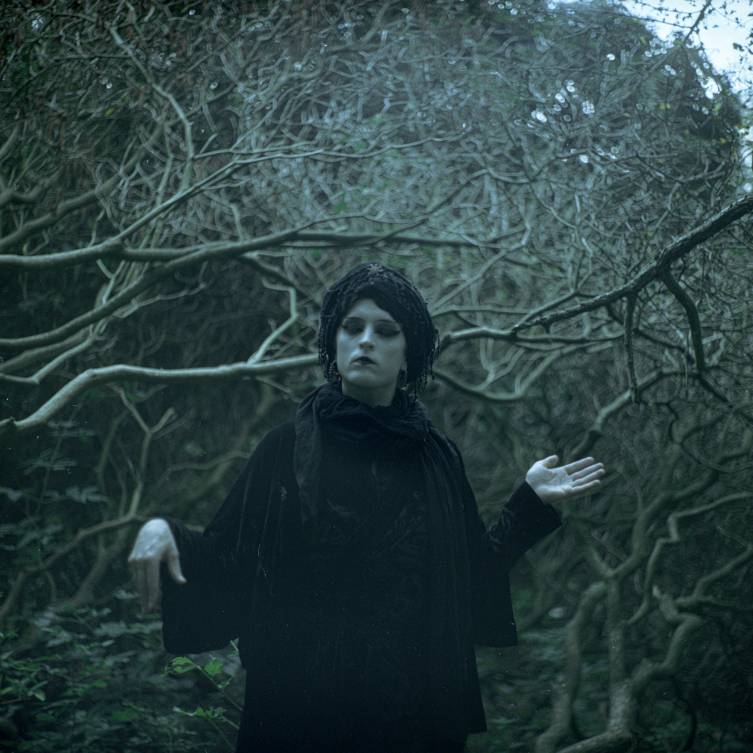
(Photo: Helena Aguilar Mayan)
JH: Yeah, maybe at some point it was exactly as you suggest. But I would say that where things are difficult changes with time as well: things that were difficult at a certain point may not be difficult later. For example, nowadays I’m used to having a huge amount of makeup and costume, and the vulnerability that would come with being without it would be more scary to me than the potential ridicule of wearing it. It's always changing, and to some extent it has to do with habit.
GG: Sure.
JH: So, it depends on where you are at every moment in your life, I guess.
GG: Whilst acknowledging that it was a courageous act, even before you get to presentation and imagery, because Tribulation were doing well, but when you left, you couldn’t have known how that was going to be for you. Your songs are awesome, but that doesn’t automatically equal success: the world is full of awesome songs that no one hears, right? So there’s that act of courageousness. It’s maybe something that I’m noticing in your work, and I wonder if you notice that in yourself?
JH: Thank you! (laughs)
GG: Would you recognise that courage inherent in what you're doing as being an important part of your message?
JH: I don’t know, but the message will be to follow your heart. That’s a very succinct way of putting it, and it’s not always that easy. But yes, it’s definitely something I find important myself, to try to follow the vision, the artistic vision. The rest, you have to figure out as you go (laughs). But, I mean, I wouldn’t necessarily say that I look at what I’m doing and think, ‘Oh, this is courageous’; no, not necessarily at all. It’s more like: ‘I need to do this, otherwise I’ll be really sad’, haha!
GG: There’s a mixture of the compulsion to be a creator with the knowledge that if you just sit and watch TV, play video games etc, then your life will still end as much as if you do something more interesting, right?
"In the same way that I see every song as a little world, or universe, and every album as a universe, every piece of art is also a little contained universe."
JH: Yeah, and I love playing video games! I actually played a lot of video games until I was about 21. I had all the consoles and I was so invested in it, I was looking for the news of when a new game would come out. I went back and played all the classics. I was a big Zelda fan (laughs) and I had a PS3 when that was a thing, but at some point, I was extending my adolescent years up into my early twenties. It felt like I was strangling myself slowly, a sense of unease making itself present as a vague sensation at the back of my head. I realized that things couldn't stay as they were, so I sold all the consoles and spent more time on music and illustration.
GG: Uh-huh! I entirely understand what you’re saying, and this is going back to the courage! A lot of people might not do that. They might stay in that extended adolescence for a very long time, and feel the way you felt, but they won't take those steps to change, and that’s why I think it’s important for us to talk about that.
JH: And not that there’s anything wrong with video games, I still love video games! I’m still waiting for Silksong - Hollow Knight 2, haha!
GG: I’m just happy that they remade Silent Hill 2 and that it was decent! I’m very happy about that. But anyway, going back to the idea of journeys. I feel like the Chants record was a journey in itself: though each song had its own narrative, it felt to me that I was going on a journey with you. With this new record, are we continuing that same journey, or is this a completely new one? In terms of your headspace, are we in that same world, or have we gone somewhere else?
JH: Good question! Maybe this can answer it. The first album had songs from a period of time that spanned about ten years or more. Some of it was written by a twenty-something person, and as you said earlier, some of them are very much a feeling of sitting in one space and sort of waiting for something to happen but not knowing how to proceed, or how to pursue it. It’s just a feeling of wanting to go on an adventure, exactly.
Now, it’s different. This album was written from more recent life experiences. I started writing it in the beginning of 2023, so it was less than two years ago that the first chord was struck. It’s sort of the same journey but if you see it as a spiral, it’s the next turn up the spiral. And it’s a different type of journey but I guess every journey has a beginning, a middle and an end, so they are all kinda similar! (laughs)
GG: Right! In that case, is it maybe continuing the journey, but from a slightly different person?
JH: Yes! Yeah, very much so.
GG: Because that kind of changes everything, even the way you would look at a sound or a chord progression. You’d have an opinion on it when you were 25, and another opinion on it when you were 35.
JH: That’s it, yeah. Very much.
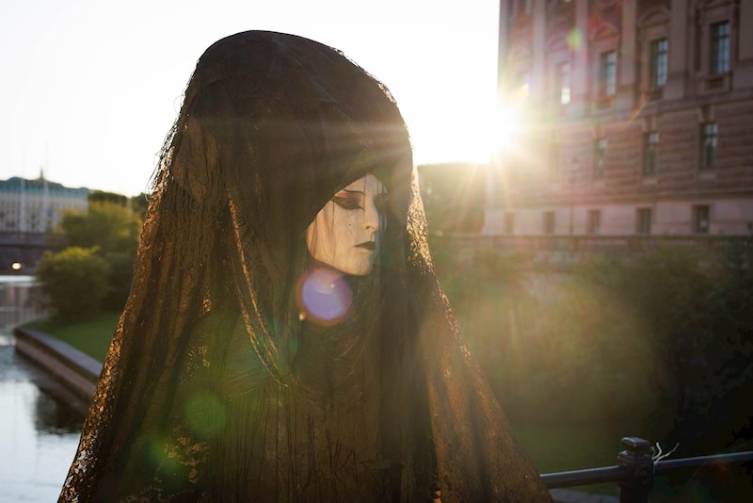
Narratives, Keys & a Bad Van Halen Analogy
GG: So is there an overall narrative to the album?
JH: Yes, I would say so. I really like the idea of seeing every song as a world of its own, but also, the progression of a song as a world of its own. In other words, the record itself is a rollercoaster in terms of a narrative story. Even if it’s subtle, leaving a tiny thread, it doesn’t have to be an actual story. An emotional story, maybe.
GG: I’m interested in the points where you have some purely instrumental music too, occasionally in between the vocal songs. Do they represent different parts of the story? Like, half way through the album there’s a wonderful instrumental - Through the Fog into the Sky - is that like the curtain going down on act one, preparing us for act two?
JH: Yes, that’s exactly what it is!
GG: Oh good! And are all of the keys performed by you?
JH: Yes.
GG: That’s really impressive! Is piano your first instrument?
JH: Thank you! No, it’s my second, I guess.
"The Afterlife doesn’t necessarily refer to an actual afterlife, more so as a metaphor for when you find yourself in a place where you feel like everything has become stagnant, and you feel that if you stay in this place, you will wither away and gradually become a ghost without noticing it."
GG: Ok, now stick with me here: how familiar are you with Van Halen?
JH: Not very familiar. I know some of the hits.
GG: Alright. My cack-handed analogy was going to be: in the early days, Eddie would write the music on his guitar, but when they changed the singer, he started writing more on keyboards, adding the guitar parts afterwards. This really, really changed the sound of the band, and changed both what and how he played guitar on his songs. So, I wondered, since you’re playing both keys and guitar, do you write songs on the keys, or is that a layer that comes in after the guitar? And do you ever write something on one instrument but then end up using it on another instrument?
JH: Sometimes I write on keys, again it depends on the song and it can shift. Sometimes something that was written on the keys can turn into a guitar song and vice versa. Sometimes it’s just a melody in my head and it’s turned into a melody on whatever instrument I happen to find at the time, and I just add things around it. It’s very varied.
GG: Do you just have an instinctive sense of which instrument should be playing which part?
JH: Yeah, for example the 4th song - Riverflame - that was originally a guitar track. It changed to become a piano song.
GG: So the song will tell you what it wants.
JH: Yeah, exactly! And because right now I’m performing live with a guitar, I need to find a way to translate it to guitar. In the end, it’s just notes and how you execute them when performing that determines what you use.
Recreating It All Live
GG: That actually brings me to a point I wanted to cover with you. Your first record has lots of elements, but I’d say it’s instrumentally sparser than the new album. This one is more expansive sounding, with a greater variety of instruments. I wonder: how are you going to approach performing these songs live?
JH: I dunno! (laughs) We’ll see! I have vague ideas.
GG: Are you thinking about using backing tracks?
JH: Yeah, but I don’t want to rely too much on things that aren’t performed live. How it looks right now, it will probably be a reworking of the songs to fit the live setting as it is right now. But who knows? My dream is to have more people on stage to perform in different constellations, to see it more as an art project.
GG: Oh wow, like a collaborative thing based on what you do?
JH: Yeah, exactly.
GG: On the records, there are so many layered, harmonised vocals: do you use harmony devices live in order to cover all of those vocal tracks? Do you get the harmonies you need from such devices or pedals?
JH: They are software, basically. They are programmed, but they are not prerecorded. What comes in through the microphone is being processed in real time.
GG: It’s supplying the harmonic intervals that you’ve programmed.
JH: Yeah, exactly. I’m pretty happy with that as a compromise, like a substitute for a real choir right as of now, because obviously I don’t have people with me on stage. I would love to have real voices instead of synthetic harmonies.
"The symbol of the labyrinth and the underworld are very powerful symbols for struggle, and for when you’re feeling lost and can’t find your way out. It’s very applicable to many situations in our lives and throughout our lives in different forms."
GG: On the record, you obviously sing all of the vocals. They are so on-point: are you using any vocal correction stuff like Autotune?
JH: As little as possible. Sometimes it might even sound better if it’s out of tune by a few degrees, because there will be tension in the composition. Having perfection is not always the way to go in order to create an expression, so yeah, sometimes it is slightly adjusted but not always, because if it sounds perfect, it just becomes a robot!
GG: Yeah, at that point, it may as well be played on a keyboard with a choir plugin, right?
JHL Yeah, yeah, exactly.
GG: It’s that reminder of humanity, isn’t it? It’s the reason we like to hear the sound of the fingers sliding on the guitar strings. It’s not something that a computer would do.
JH: Sometimes it might even be better to skip it: you tamper with it, and then go back to how it was at the beginning and realise that it’s so much more expressive: let’s just leave it at that!
GG: Yeah, definitely, whatever the song itself dictates. With those choral vocals, I hear a really devotional or religious sound with that. Is that something you have as an influence? And is there a spiritual or religious path in your life that you follow?
JH: As for the music, I just really like choral music. I listen to a lot of genres. I don’t have a fixed taste: a lot of different things appeal to me and have influenced me in the past. I just love harmonies and how they are built, especially the tight harmonies that are stacked upon each other. Not just the three notes that make out a chord but the notes in between that make it sound so full.
GG: Those extra colours.
JH: Yeah, yeah! I’m still fascinated at how it works. You just move one note half a step up and another chord is created. That fascinated me the first time I was told about it and I’m still fascinated about it; about how music works.
Artwork & Thematics
GG: For sure. The beauty of music! Now, your artwork is absolutely beautiful too, and when we had our email interview a few years ago, you said that the artwork almost came symbiotically, or that one discipline informed the other. I’ve not seen the new artwork yet, but when I think back to Chants, one of the big themes that seems to pop up for me visually is nature. Forests, woodland, mountains and so on. First off, was that an important part of Chants?
JH: Mm, yeah, it absolutely was.
GG: Okay, so with this record then, is there a visual thematic that’s bringing the songs together?
JH: Yeah. If Chants was about the forest and mountains and the trees in general, that was a call for adventure in general, but it was also a call for stillness, like being still in nature. This album is more about movement, it’s about standing up. If Chants - and the Forest Sessions, for that matter - were about sitting still and meditating (laughs) and going on an inward journey, then this album is about you standing up and starting to look at the stars in the sky, and starting to walk that journey.
GG: I understand. I like the comment about the meditation, that leads me back into the choral thing: is that a practice you take part in? An inward meditative process?
JH: I don’t meditate much any more. I go for a lot of walks, but I really wish it was something I incorporated more into my life. Like a daily routine, and that’s the difficult part of it: to make it something not only done on special occasions, but a part of everyday life.
GG: The accumulation is when such a practice has its benefit, right?
JH: Yes, exactly.
GG: But we mentioned earlier that going for a walk is its own meditation, its own sort of journey.
JH: Yes, that’s when things happen: you can work through things, and ideas come up as well.
GG: Whether you go looking for them or not, the simple act of moving elsewhere sometimes just allows - I don’t know if you believe in the creative unconscious - but some stuff that’s just floating around will find its way in, right?
JH: Yeah, yes. A space is made for that creativity to take place.
Gear: Guitars and Keyboards
GG: So, one thing we haven’t spoken about is guitars and keyboards! When last we spoke, and when I watch performances of you on Youtube, it’s normally an Ibanez acoustic you use, is that right?
JH: Yeah, I’m still using the same one!
GG: Do you use standard tuning?
JH: It’s D tuning, and for some songs, I drop the D string to C.
GG: Right, I see: D standard with the occasional drop C. I didn’t realise you used that!
JH: Oh yeah! It sounds heavy (laughs).
GG: Everything sounds gorgeous in that tuning. (Jonathan opens his guitar case and passes me his guitar). Oh, look at this! It’s looking fantastic, so it’s an AEL40. (I spy some remedial work carried out on the guitar)
JF: I installed a new pickup in there, an LR Baggs.
GG: And what strings do you use?
JH: I use Elixir 12-53.
GG: And last time we spoke, you used a Dunlop Jazz III XL. Is that still the case?
JH: Yeah, these are still the ones!
GG: So, from the guitar, do you go into any effects or preamps in a live situation?
JH: No, everything is in Logic: everything is a project. I’m using the internal…like, I have a stack of 15, maybe 20 channels of guitar sounds, and then I alter the volume of each channel depending on how much of it I want for each specific song. Together, they create a sound that is specific for that song.
GG: Wow!
JH: Yeah! You could say that everything is playing at once, only that certain tracks are automated down in volume.
GG: I see what you’re saying, it’s a matter of getting the mix of those 15 or 20 that you want for that given moment?
JH: Yeah!
GG: So, would that be like reverb, delay, EQ, that type of thing?
JH: Yeah, that too!
GG: Riiight! And would Logic also be simultaneously running the algorithms for your vocal harmonies?
JH: Yes, yep.
GG: Right! So if your laptop goes down, you’re in trouble!
JH: Indeed, haha!
GG: Is it Mainstage you’re using as well?
JH: No, I was looking into Mainstage but I’m just used to Logic so it was easier for me to use it.
GG: It’s so interesting how you’re using it! I never even thought about automating a bunch of channels like that, live!
JH: I mean, I don’t know if it's good or it’s bad…I’m getting a lot of help sometimes from sound engineers who are pointing out ‘Hey, this song has a very weird sound!’ I don’t have any education or any knowledge, really, I just have an idea and try to make it happen! I solve it as I go.
GG: That’s the artist’s way!
JH: I’m grateful for all of the advice I get along the way!
"The message would be to follow the heart. That's a very succint way of putting it, and it's not always that easy"
GG: Absolutely. And what about the keyboard instruments that you use?
JH: It’s Arturia, the Analog Collection sound library.
GG: Right, any particular favourites?
JH: Hmm, there were some that I continually go back to…I like the Farfisa, and what else? There was a Korg in there that I really like…
GG: I think you have a newer version of the software than me, haha! I have no Korg in mine. So, there’s more electric guitar on this new record than on the previous one. What guitars were you using?
JH: I use my old Epiphone Sheraton that I used in the old band I was in, then I also went to my home town in Arvika and borrowed a Fender Stratocaster and a Telecaster as well. The Epiphone has different pickups than the humbucker ones.
GG: Oh, you changed them out?
JH: Yeah, we got sponsored by Lace. The pickups it got have a higher output and a clearer, treble sound. I used the Strat and Telecaster for some of the melodies, and just to make it more interesting. Maybe it’s not a huge difference, but it’s a little difference at least!
GG: Sure, and there's a real difference in even just handling different instruments: utilising different guitar models net you different results.
JH: Absolutely, yeah.
Universe Building, and Creating Those Outfits
GG: Excellent. Now, just as I look back over my notes before we finish up, there’s one extra thing I missed out from earlier on. Relating to storytelling, imagery, mythology and all of those things we spoke about earlier…you aren’t somebody who just shows up to a gig in their jeans and t-shirt. You’ve got specific outfits that you put together; specific makeup that you want to wear. You present a particular image. Your artwork projects a particular vibe…what I’m getting at is: are you putting together a sort of personal mythology, or private mythology? Are you building your own universe?
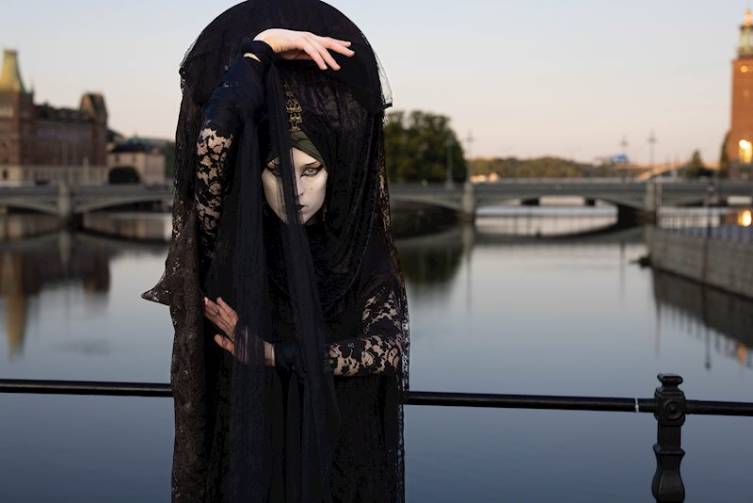
JH: In the same way that I see every song as a little world, or universe, and every album as a universe, every piece of art is also a little contained universe. And also, the stage outfits: every piece is a whole of its own, but together, they also are part of a bigger whole. So, it’s like a Russian Doll!
GG: Haha, sure! So does one refer to the context of another? Like, we spoke about the art and the music, but what about the outfits? Do they belong to the same universe that you’re describing with the songs and the art? Do you have the same information going in those directions?
JH: Absolutely. Maybe to be fair, the music might be influencing the visual side a little bit more - maybe 60/40 rather than it being 50/50 - and it often comes first. Then of course, everything already exists, it’s just been dragged down to this universe, this sphere. But yeah, composing an outfit, drawing artwork, drawing for a music video: it all is involved in each other all the time.
GG: I’m so intrigued by your outfits because they are so otherworldly and so unique to you. Presumably you have a hand in designing them…
JH: Yeah.
GG: But do you work with someone else? How does that whole process work?
JH: No, I usually start with drawing something, like ‘Oh, this could work, I like this, this is cool, I would like to see this manifested in real life’. Then the idea might not always be exactly how things turn out, but at least it’s a guiding direction. Then I’ll just take what I can find in thrift shops or I go through all my drawers (laughs) and anything that could work for, like, the headpieces: ‘what could serve as a foundation to create this form? What kind of structure could support this?’ So, it’s all DIY, and it’s all about finding whatever could work to live up to that mental picture that exists in my imagination.
GG: Goodness me! I thought you must have farmed it out to some design company and said ‘Make this!’
JH: That would be super cool, I would like to try that! (laughs)
GG: Wow, so it’s all you. That’s amazing! Okay, so to round things off, the record is out on January 31st. What’s next for you after that?
JH: More touring in the US with Uncle Acid in February and then…we’ll see!
We’ll see indeed! Jonathan’s music is as accessible as it is evocative, and is well worth exploring. If you get the opportunity to see him live, you’ll encounter the music as perhaps it is meant to be experienced, so don’t miss him if he’s passing through your town!
Eyes of the Living Night is released on 31st January on Kscope records. Head to the official Jonathan Hultén website for tour dates, merch and more.
My thanks to Jonathan for giving up his morning in Edinburgh for me, and for such a stimulating conversation. Thanks also to Simon Glacken, and to The Cult’s crew for being so accommodating.
Head over to the guitarguitar Interviews page for over 200 unique and exclusive interviews!

